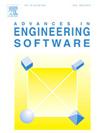Optimization design method of C30/C40 fly ash concrete based on machine learning and elite retention genetic algorithm
IF 5.7
2区 工程技术
Q2 COMPUTER SCIENCE, INTERDISCIPLINARY APPLICATIONS
引用次数: 0
Abstract
This paper establishes an intelligent optimization design method for fly ash (FA) concrete considering 28-day compressive strength, slump, and carbon emissions based on machine learning (ML) and elite retention genetic algorithm (EGA). The results demonstrate that the Extreme Gradient Boosting (XGB) model achieves high accuracy in predicting compressive strength, while Gradient Boosting (GB) shows higher accuracy and generalization ability in predicting slump. The water-to-binder ratio and cement content have a significant impact on the compressive strength of FA concrete. Reducing the water-to-binder ratio or increasing cement content helps improve compressive strength. The dosage of superplasticizer and the water content are key factors in controlling the slump. Properly increasing the dosage of superplasticizer and water content can effectively improve the slump of concrete. The FA concrete intelligent design system developed based on the XGB model, GB model, and EGA algorithm can efficiently obtain the optimal preparation parameters and accurately predict the corresponding performance. Furthermore, the carbon emissions of the optimized C30 and C40 FA concrete decrease by 12.72 % and 17.44 % respectively compared to the baseline concrete. Finally, the experimental results verify the prediction accuracy and generalization ability of the XGB and GB models, with the relative prediction error of C30 and C40 FA concrete both being less than 8 %.
基于机器学习和精英保留遗传算法的C30/C40粉煤灰混凝土优化设计方法
本文建立了一种基于机器学习(ML)和精英保留遗传算法(EGA)的考虑28天抗压强度、坍落度和碳排放的粉煤灰混凝土智能优化设计方法。结果表明,极端梯度增强(XGB)模型在预测抗压强度方面具有较高的精度,梯度增强(GB)模型在预测坍落度方面具有较高的精度和泛化能力。水胶比和水泥掺量对FA混凝土抗压强度有显著影响。降低水胶比或增加水泥掺量有助于提高抗压强度。高效减水剂的用量和含水量是控制坍落度的关键因素。适当增加减水剂掺量和水掺量,可有效改善混凝土坍落度。基于XGB模型、GB模型和EGA算法开发的FA混凝土智能设计系统可以高效地获得最优的制备参数并准确预测相应的性能。此外,优化后的C30和C40 FA混凝土的碳排放量分别比基准混凝土减少12.72%和17.44%。最后,实验结果验证了XGB和GB模型的预测精度和泛化能力,C30和C40 FA混凝土的相对预测误差均小于8%。
本文章由计算机程序翻译,如有差异,请以英文原文为准。
求助全文
约1分钟内获得全文
求助全文
来源期刊

Advances in Engineering Software
工程技术-计算机:跨学科应用
CiteScore
7.70
自引率
4.20%
发文量
169
审稿时长
37 days
期刊介绍:
The objective of this journal is to communicate recent and projected advances in computer-based engineering techniques. The fields covered include mechanical, aerospace, civil and environmental engineering, with an emphasis on research and development leading to practical problem-solving.
The scope of the journal includes:
• Innovative computational strategies and numerical algorithms for large-scale engineering problems
• Analysis and simulation techniques and systems
• Model and mesh generation
• Control of the accuracy, stability and efficiency of computational process
• Exploitation of new computing environments (eg distributed hetergeneous and collaborative computing)
• Advanced visualization techniques, virtual environments and prototyping
• Applications of AI, knowledge-based systems, computational intelligence, including fuzzy logic, neural networks and evolutionary computations
• Application of object-oriented technology to engineering problems
• Intelligent human computer interfaces
• Design automation, multidisciplinary design and optimization
• CAD, CAE and integrated process and product development systems
• Quality and reliability.
 求助内容:
求助内容: 应助结果提醒方式:
应助结果提醒方式:


